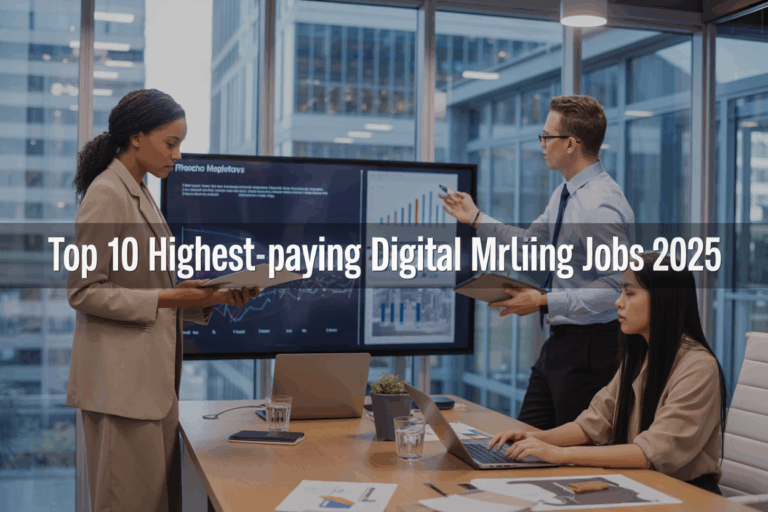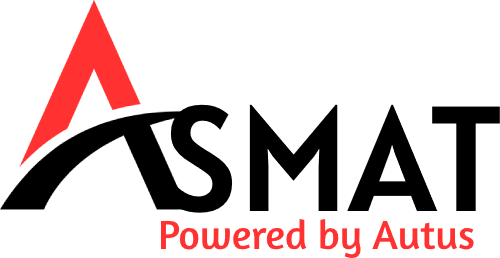
Digital marketing careers are booming, and the highest-paying jobs in 2025 can launch your income into six-figure territory. This guide is perfect for marketing professionals looking to level up their careers, recent graduates exploring lucrative digital paths, and anyone curious about where the money really is in digital marketing.
The digital marketing landscape has changed dramatically, with companies now paying premium salaries for specialists who can drive measurable results. We’ll break down the exact roles commanding the biggest paychecks, from Digital Marketing Directors pulling in $150K+ to independent consultants building million-dollar practices.
You’ll discover which leadership positions offer the most earning potential, including Chief Marketing Officer roles at tech companies and Fortune 500 Social Media Strategy Directors. We’ll also explore the specialized technical roles that companies are desperate to fill, like Marketing Automation Specialists and SEO Consultants who focus on enterprise-level optimization.
Each job profile includes real salary ranges, required skills, and the career path to get there. Ready to see which digital marketing jobs are actually worth your time?
Digital Marketing Director Roles That Command Six-Figure Salaries
Strategic Leadership Responsibilities and Compensation Ranges
Digital Marketing Directors sit at the apex of marketing strategy, earning between $120,000 and $250,000 annually, with bonuses pushing total compensation well beyond $300,000 in major markets. These professionals orchestrate comprehensive marketing ecosystems across multiple channels, platforms, and customer touchpoints.
The role demands mastery of both strategic vision and tactical execution. Directors develop long-term marketing roadmaps that align with business objectives while managing quarterly performance metrics. They own P&L responsibility for marketing spend, typically overseeing budgets ranging from $500,000 to $5 million annually. Top performers who consistently deliver measurable ROI command premium salaries, especially those with experience scaling marketing operations from startup to enterprise levels.
Compensation varies significantly by industry and company size. Tech companies and SaaS organizations often pay 20-30% above market rates, while established Fortune 500 companies offer comprehensive benefits packages that include equity participation. Directors with proven track records in high-growth environments can negotiate signing bonuses, accelerated vesting schedules, and performance-based salary increases that compound earning potential.
Enterprise-Level Campaign Management Requirements
Managing enterprise-level campaigns requires sophisticated technical skills and deep understanding of complex customer journeys. Digital Marketing Directors oversee multi-million dollar campaigns that span 6-12 month cycles, coordinating efforts across paid search, social media, content marketing, email automation, and traditional advertising channels.
These campaigns involve intricate attribution modeling, where directors must track customer interactions across dozens of touchpoints before conversion. They work with advanced marketing technology stacks including Salesforce, HubSpot, Adobe Experience Cloud, and custom-built analytics platforms. Directors who master these systems can demonstrate clear ROI on marketing investments, making them invaluable to executive teams.
Enterprise campaigns also require regulatory compliance knowledge, especially for companies operating in healthcare, finance, or international markets. Directors must navigate GDPR requirements, industry-specific advertising restrictions, and brand safety protocols while maintaining aggressive growth targets. This specialized knowledge significantly boosts earning potential.
Team Building and Budget Oversight Skills That Increase Earning Potential
Building and leading high-performing marketing teams directly correlates with compensation growth. Directors typically manage teams of 5-15 specialists including paid media managers, content creators, marketing analysts, and marketing operations professionals. Those who excel at talent development and retention become highly sought after by executive recruiters.
Budget management skills separate good directors from exceptional ones. Top earners can optimize marketing spend allocation across channels, demonstrating how budget shifts impact customer acquisition costs and lifetime value. They present clear budget forecasts to C-suite executives, justifying increased marketing investments with data-driven projections.
Directors who develop strong cross-functional relationships with sales, product, and customer success teams create additional value streams. They align marketing campaigns with product launches, sales quotas, and customer retention goals, making their role essential to overall business success. This strategic positioning leads to accelerated career advancement and salary negotiations from positions of strength.
Chief Marketing Officer Positions in Tech Companies
Executive Decision-Making Authority and Salary Expectations
Chief Marketing Officers at tech companies wield tremendous influence over brand positioning, customer acquisition strategies, and revenue-driving initiatives. Their compensation reflects this executive responsibility, with base salaries ranging from $250,000 to $500,000 annually at mid-tier tech companies, while top-tier organizations like Google, Meta, and Apple offer packages exceeding $800,000.
The salary structure typically includes multiple components: base salary, annual performance bonuses (20-40% of base), equity grants, and comprehensive benefits. CMOs at Series B and C startups often accept lower base salaries ($180,000-$300,000) in exchange for substantial equity upside potential. Public tech companies provide more predictable compensation but with smaller equity multipliers.
Geographic location significantly impacts earning potential. San Francisco Bay Area CMOs command premiums of 25-40% above national averages, while Austin, Seattle, and New York markets offer competitive packages with better cost-of-living ratios. Remote-first companies have begun standardizing compensation across locations, creating opportunities for CMOs in lower-cost markets.
Experience level drives substantial salary variations. First-time CMOs typically start at the lower end of ranges, while seasoned executives with proven track records of scaling companies through IPOs or acquisitions negotiate premium packages. The shortage of qualified C-level marketing talent gives experienced professionals significant leverage in negotiations.
Brand Strategy Development for Global Markets
Tech company CMOs orchestrate complex brand strategies spanning multiple continents, product lines, and customer segments. This responsibility involves coordinating localized campaigns across diverse cultural contexts while maintaining brand consistency and core messaging pillars. The complexity of managing global brand architecture justifies substantial compensation premiums.
Successful global brand strategists understand regional market dynamics, regulatory environments, and competitive landscapes. They build frameworks for adapting messaging across languages and cultures while preserving brand integrity. This expertise requires deep international experience, often commanding salary premiums of $50,000-$100,000 above domestic-focused roles.
Tech CMOs lead cross-functional teams including regional marketing directors, product marketing managers, and external agency partners. They develop comprehensive brand guidelines, messaging hierarchies, and go-to-market strategies for new product launches. The ability to orchestrate these complex initiatives while maintaining brand coherence across touchpoints represents specialized expertise that organizations compensate generously.
Digital-first brand strategies require technical sophistication around marketing technology stacks, data analytics platforms, and automation tools. CMOs who successfully integrate brand strategy with performance marketing initiatives demonstrate measurable business impact, strengthening their negotiating position for compensation increases and role expansion.
Revenue Growth Accountability and Performance Bonuses
Tech companies tie CMO compensation directly to revenue growth metrics, customer acquisition costs, and lifetime value optimization. Performance bonuses often represent 30-50% of total compensation, creating significant earning potential for results-driven executives. These variable compensation structures align executive incentives with business outcomes.
Typical performance metrics include marketing qualified leads (MQLs), sales-qualified leads (SQLs), customer acquisition cost (CAC), return on advertising spend (ROAS), and revenue attribution models. CMOs who consistently exceed targets often negotiate higher bonus percentages and expanded performance criteria that include brand awareness metrics and customer satisfaction scores.
Quarterly and annual bonus structures provide multiple earning opportunities throughout the year. High-performing CMOs at fast-growing tech companies report total bonuses exceeding $200,000 annually, with some reaching $500,000+ at companies experiencing rapid scaling phases. These payouts require documented proof of marketing’s contribution to pipeline generation and revenue growth.
Performance accountability extends beyond traditional marketing metrics to include cross-functional collaboration scores, team retention rates, and strategic initiative completion. CMOs who excel at building high-performing teams while delivering measurable business results position themselves for accelerated career advancement and compensation growth.
Stock Options and Equity Compensation Packages
Equity compensation distinguishes tech industry CMO roles from traditional corporate marketing positions. Stock options, restricted stock units (RSUs), and performance-based equity grants often represent 40-60% of total compensation value, creating substantial wealth-building opportunities for successful executives.
Pre-IPO companies typically offer ISO (Incentive Stock Options) with four-year vesting schedules and one-year cliffs. CMOs joining during Series A-C funding rounds receive equity grants ranging from 0.25% to 1.5% of company ownership, depending on stage and negotiation skills. These positions carry higher risk but offer exponential upside potential through successful exits.
Public tech companies provide RSUs with quarterly vesting schedules, offering more predictable equity value realization. Annual refresh grants keep equity compensation competitive and provide retention incentives. Top-performing CMOs negotiate additional performance-based equity awards tied to specific business milestones or stock price achievements.
Equity package negotiations require sophisticated understanding of valuation methodologies, dilution impacts, and tax implications. CMOs often engage financial advisors to optimize equity structures, including decisions around early exercise options, tax elections, and diversification strategies. The potential for equity compensation to generate life-changing wealth makes these roles particularly attractive to ambitious marketing executives.
Marketing Automation Specialists Earning Premium Wages
Advanced Technical Skills That Drive Higher Pay
Marketing automation specialists who master advanced technical skills see their salaries jump significantly above entry-level positions. Database management expertise becomes crucial when handling millions of customer records and complex segmentation strategies. These professionals need to understand SQL queries, API integrations, and data warehouse architecture to create sophisticated automation workflows.
Advanced practitioners excel at building multi-touch attribution models that track customer journeys across dozens of touchpoints. They create dynamic content personalization engines that adapt messaging based on behavioral triggers, demographic data, and purchase history. The ability to implement progressive profiling strategies helps companies gather customer intelligence without overwhelming prospects with lengthy forms.
Custom field mapping and data synchronization between multiple platforms requires deep technical knowledge. Top specialists configure complex lead scoring algorithms that weight various engagement factors, from email opens to website behavior patterns. They also master advanced reporting capabilities, creating custom dashboards that provide actionable insights for C-level executives.
The most valuable specialists understand HTML/CSS coding for email templates and landing pages, allowing them to customize designs beyond standard templates. JavaScript knowledge enables them to implement tracking pixels, custom analytics, and advanced form behaviors that capture more qualified leads.
Platform Expertise in HubSpot, Marketo, and Pardot
Platform-specific expertise commands premium salaries because companies invest heavily in these enterprise solutions and need specialists who can maximize their ROI. HubSpot specialists who achieve advanced certifications across their entire ecosystem – including Sales Hub, Service Hub, and CMS Hub – position themselves for roles paying $80,000-$120,000 annually.
Marketo expertise proves especially valuable for B2B companies managing complex sales cycles. Specialists who master Marketo’s revenue cycle analytics, advanced segmentation, and engagement programs often earn $90,000-$140,000. Understanding Marketo’s unique tokens, velocity scripting, and webhook integrations sets experts apart from basic users.
Pardot specialists benefit from Salesforce’s massive ecosystem, with certified experts earning $85,000-$130,000. Deep knowledge of Pardot’s Einstein features, B2B Marketing Analytics, and advanced automation rules creates significant value for organizations using Salesforce CRM.
| Platform | Average Salary Range | Key Specializations |
|---|---|---|
| HubSpot | $80,000 – $120,000 | Workflows, Smart Content, Attribution |
| Marketo | $90,000 – $140,000 | Revenue Cycle, Velocity Scripting, Engagement |
| Pardot | $85,000 – $130,000 | Einstein AI, B2B Analytics, CRM Integration |
Multi-platform expertise creates the highest earning potential, with specialists commanding 20-30% salary premiums when they can migrate data between systems and architect integrated marketing stacks.
ROI Optimization Strategies That Justify High Salaries
Marketing automation specialists earn premium wages by delivering measurable business impact through sophisticated ROI optimization strategies. They implement attribution modeling that accurately tracks revenue generation across multiple touchpoints, proving marketing’s direct contribution to sales outcomes.
Conversion rate optimization becomes a core competency, with top specialists running sophisticated A/B tests on email subject lines, landing page layouts, and call-to-action placement. They analyze open rates, click-through rates, and conversion metrics to continuously refine campaign performance. Advanced practitioners implement multivariate testing that examines multiple variables simultaneously.
Lead nurturing sequences that move prospects through complex B2B sales funnels generate substantial value. Specialists design automated workflows that deliver the right content at optimal moments, reducing sales cycle length and increasing deal closure rates. They create scoring models that identify sales-ready leads with 80-90% accuracy.
Customer lifecycle automation generates recurring revenue through retention campaigns, upsell sequences, and win-back programs. These specialists build automated systems that increase customer lifetime value by 25-40%, directly impacting company profitability.
Revenue attribution reporting connects marketing activities to closed deals, demonstrating clear ROI on marketing automation investments. When specialists can show that their campaigns generated $500,000 in new business from a $50,000 automation platform investment, justifying six-figure salaries becomes straightforward.
Performance Marketing Managers with Proven Track Records
Paid Advertising Campaign Management Expertise
Performance marketing managers who master paid advertising across multiple platforms command impressive salaries because they directly impact revenue. These professionals excel at managing substantial advertising budgets on Google Ads, Facebook, LinkedIn, TikTok, and emerging platforms while maintaining profitable return on ad spend (ROAS) ratios.
The most successful managers understand the nuances of each platform’s auction system, audience targeting capabilities, and creative requirements. They know how to structure campaigns for maximum efficiency, from keyword research and negative keyword management to audience segmentation and bid optimization strategies. Top performers can scale campaigns from thousands to millions in monthly spend while maintaining or improving performance metrics.
Advanced campaign managers also stay ahead of platform updates, beta features, and policy changes that could impact performance. They build relationships with platform representatives to access exclusive tools and early feature releases, giving their campaigns competitive advantages.
Data Analytics Skills That Maximize Client Budgets
High-earning performance marketing managers possess deep analytical skills that go beyond basic reporting. They create comprehensive tracking systems that capture every customer touchpoint, enabling precise attribution and optimization decisions. These professionals understand SQL, Google Analytics 4, and advanced Excel functions to uncover insights that drive campaign improvements.
The ability to build custom dashboards and automated reporting systems saves countless hours while providing real-time performance visibility. They identify patterns in data that reveal new opportunities, such as high-converting audience segments, optimal bidding times, or underperforming creative elements that need immediate attention.
Statistical analysis capabilities separate top performers from average managers. They conduct proper A/B tests with statistical significance, understand incrementality measurement, and can interpret complex attribution models to make informed budget allocation decisions across channels and campaigns.
Multi-Channel Attribution Modeling Capabilities
Modern performance marketing requires sophisticated attribution modeling skills that accurately measure each channel’s contribution to conversions. The highest-paid managers understand first-touch, last-touch, and multi-touch attribution models, knowing when to apply each methodology based on business goals and customer journey complexity.
They implement advanced tracking solutions using Google Tag Manager, server-side tracking, and customer data platforms to create unified views of customer behavior across all touchpoints. This expertise becomes particularly valuable for businesses with long sales cycles or complex customer journeys involving multiple devices and platforms.
Machine learning attribution models represent the cutting edge of this field. Top performers leverage Google Analytics 4’s data-driven attribution or build custom models using Python and machine learning libraries. They understand how to interpret and act on attribution insights, shifting budgets toward channels that drive the most valuable customers rather than just the most conversions.
Client Retention Strategies That Boost Income Potential
Successful performance marketing managers build long-term relationships that lead to contract renewals, expanded scopes, and referral opportunities. They communicate results proactively, providing regular performance updates with clear explanations of what’s working, what’s not, and their planned optimizations.
These professionals become strategic partners rather than just campaign executors. They contribute to broader marketing strategy discussions, identify new growth opportunities, and suggest ways to improve overall marketing effectiveness beyond their direct responsibilities.
Building internal champions at client companies creates job security and income growth potential. They train client teams on campaign insights, share industry best practices, and position themselves as indispensable resources. Many transition into higher-paying consulting roles or start their own agencies based on strong client relationships developed during their employment.
Regular performance reviews with clear ROI demonstrations justify premium pricing and salary increases. They document case studies of successful campaigns and optimizations that showcase their direct impact on business growth and revenue generation.
E-commerce Marketing Directors Leading Digital Transformation
Online Revenue Generation Responsibilities
E-commerce marketing directors carry the weight of massive revenue targets on their shoulders. These professionals typically oversee digital channels generating anywhere from $50 million to $2 billion annually, depending on company size. They orchestrate complex omnichannel strategies that span paid advertising, email campaigns, affiliate partnerships, and marketplace optimization.
Revenue forecasting becomes a critical skill as these directors must predict quarterly performance across dozens of marketing channels. They analyze customer lifetime value patterns, seasonal trends, and market disruptions to build realistic projections. Many successful directors develop proprietary attribution models that track the customer journey from first touchpoint to final purchase, ensuring every marketing dollar gets properly credited.
The best e-commerce marketing directors also champion new revenue streams. They identify emerging platforms, test innovative campaign formats, and pilot subscription models or membership programs. This forward-thinking approach often separates six-figure earners from their peers.
Customer Acquisition Cost Optimization Techniques
Smart customer acquisition cost (CAC) management separates profitable e-commerce operations from money-losing ventures. Top marketing directors establish CAC targets by customer segment, product category, and acquisition channel. They typically aim for CAC-to-LTV ratios between 1:3 and 1:5, adjusting based on industry benchmarks and company growth stage.
Advanced practitioners implement dynamic bidding strategies across Google Ads, Facebook, and Amazon advertising platforms. They use machine learning algorithms to automatically adjust bids based on conversion probability, competitor activity, and inventory levels. This automated approach often reduces CAC by 20-35% while maintaining conversion volume.
Cohort analysis becomes essential for long-term optimization. These directors track how acquisition costs vary by customer cohorts over time, identifying which channels deliver the most valuable customers. They often discover that higher-CAC channels like influencer partnerships or premium placements actually generate more profitable customers in the long run.
Conversion Rate Improvement Strategies
Conversion rate optimization demands both analytical rigor and creative thinking. Experienced e-commerce marketing directors run continuous A/B tests across landing pages, product pages, checkout flows, and email campaigns. They typically manage 15-25 simultaneous tests, prioritizing changes with the highest potential revenue impact.
Personalization drives many conversion improvements. These directors implement dynamic content systems that show different products, messaging, or offers based on visitor behavior, geographic location, or purchase history. Advanced personalization can boost conversion rates by 10-30% while improving customer satisfaction.
Mobile optimization remains critical as mobile commerce continues growing. Directors ensure fast page load times, streamlined checkout processes, and mobile-specific features like one-click purchasing or digital wallet integration. They often find that mobile conversion rates lag desktop by 40-60%, creating significant optimization opportunities.
Marketplace Management Across Multiple Platforms
Managing multiple marketplaces requires deep platform expertise and sophisticated inventory coordination. E-commerce marketing directors typically oversee Amazon, eBay, Walmart, Target Plus, and emerging platforms like TikTok Shop or Instagram Shopping. Each platform demands unique strategies for product listings, pricing, and promotional campaigns.
Inventory allocation across platforms becomes a strategic decision. Directors use predictive analytics to determine how much stock to allocate to each marketplace based on historical performance, seasonal trends, and promotional calendars. They balance maximizing sales velocity against avoiding stockouts or overstock situations.
Platform-specific optimization techniques vary dramatically. Amazon requires mastery of SEO keywords, sponsored product campaigns, and brand store creation. Meanwhile, social commerce platforms like Instagram focus more on visual storytelling and influencer collaborations. Successful directors build specialized teams or partnerships for each major platform.
Supply Chain Marketing Integration Skills
Modern e-commerce marketing increasingly intersects with supply chain operations. Marketing directors coordinate with procurement, logistics, and inventory teams to align promotional campaigns with product availability. They use demand forecasting to prevent marketing campaigns from outpacing inventory levels.
Cross-functional collaboration becomes essential during product launches or seasonal peaks. Directors work with supply chain partners to ensure marketing timelines align with production schedules and shipping capacity. They often build buffer inventory for high-impact campaigns or implement dynamic pricing based on stock levels.
International expansion requires sophisticated supply chain marketing integration. Directors navigate customs regulations, international shipping costs, and local market preferences while maintaining consistent brand messaging. They often pilot new markets with dropshipping or local fulfillment partners before investing in dedicated inventory.
SEO Consultants Specializing in Enterprise-Level Optimization
Technical SEO Expertise for Large-Scale Websites
Enterprise-level SEO consultants earn anywhere from $120,000 to $200,000 annually because they solve problems that can make or break million-dollar websites. These specialists understand how massive sites with hundreds of thousands of pages operate differently from smaller websites.
Technical SEO at enterprise scale means dealing with complex site architecture, server response times, and crawl budget optimization across multiple domains and subdomains. Consultants need expertise in Core Web Vitals optimization, JavaScript rendering issues, and advanced schema markup implementation.
The biggest challenge? Enterprise websites often have legacy systems, multiple CMSs, and development teams spread across different departments. A skilled consultant knows how to navigate these organizational complexities while implementing technical fixes that won’t break existing functionality.
Enterprise SEO consultants also handle international SEO challenges, including hreflang implementation across dozens of countries, CDN optimization, and managing duplicate content across regional sites. They work with development teams to implement proper canonicalization strategies and ensure mobile-first indexing compliance across massive product catalogs.
Content Strategy Development for Competitive Industries
Content strategy in competitive industries like finance, healthcare, and legal services requires deep understanding of EEAT principles and regulatory compliance. SEO consultants specializing in these verticals command premium rates because they navigate strict content guidelines while still driving organic growth.
These consultants develop comprehensive content frameworks that address every stage of the buyer journey while maintaining regulatory compliance. They create content calendars that balance informational, commercial, and transactional intent across thousands of target keywords.
Competitive analysis becomes crucial when every competitor is fighting for the same high-value terms. Successful consultants identify content gaps and opportunities that others miss, often focusing on long-tail variations and emerging search trends before competitors catch on.
The content strategy also includes managing content teams, establishing editorial guidelines, and creating scalable processes for content production. Top consultants build systems that allow enterprise companies to produce hundreds of pieces of content monthly while maintaining quality and search performance.
Link Building Campaigns That Deliver Measurable Results
Enterprise link building operates on a completely different level than small business SEO. These campaigns require building relationships with major publications, industry associations, and thought leaders who can provide high-authority backlinks that move the needle on competitive terms.
Successful enterprise SEO consultants have established networks of contacts across multiple industries. They secure links from sites like Forbes, Harvard Business Review, and industry-specific publications that smaller agencies can’t access. These relationships take years to build and maintain.
The campaigns also focus on scalable link building strategies like digital PR, data-driven content campaigns, and strategic partnerships. A single successful campaign might generate hundreds of high-quality backlinks from authoritative domains, creating lasting SEO value.
Measurement becomes critical at this level. Enterprise clients expect detailed ROI analysis showing how link building campaigns directly impact organic revenue. Top consultants use advanced attribution modeling to connect link building efforts to business outcomes, justifying their premium fees with concrete results.
| Link Building Strategy | Average Links Generated | Authority Range | ROI Timeline |
|---|---|---|---|
| Digital PR Campaigns | 50-200 per campaign | DA 70+ | 3-6 months |
| Industry Partnerships | 10-50 per quarter | DA 80+ | 6-12 months |
| Data Studies | 100-500 per study | DA 60-90 | 2-4 months |
| Thought Leadership | 20-100 per quarter | DA 75+ | 6-18 months |
Social Media Strategy Directors for Fortune 500 Companies
Brand Reputation Management Across Global Markets
Social Media Strategy Directors at Fortune 500 companies earn top-tier salaries because they protect and enhance billion-dollar brand reputations across multiple continents. These professionals typically command $180,000 to $300,000 annually, with additional bonuses tied to brand health metrics.
Managing brand reputation globally means understanding cultural nuances that can make or break campaigns. A post that resonates in North America might offend audiences in Southeast Asia. Directors must build comprehensive social listening systems that monitor brand mentions across platforms in dozens of languages. They develop rapid response protocols for negative sentiment and create content frameworks that maintain brand consistency while allowing regional adaptation.
The role requires deep expertise in crisis prevention through proactive reputation monitoring. Directors analyze sentiment trends, identify potential issues before they escalate, and coordinate with legal, PR, and executive teams to craft responses. They oversee teams across time zones, ensuring 24/7 brand protection.
Influencer Partnership Negotiation and Management
Top-performing Social Media Strategy Directors excel at securing multi-million dollar influencer partnerships that drive measurable business results. They negotiate contracts with mega-influencers commanding seven-figure fees and manage relationships with hundreds of micro-influencers simultaneously.
These directors build sophisticated influencer scoring systems that evaluate reach, engagement quality, brand alignment, and audience demographics. They structure performance-based compensation models that tie influencer payments to specific KPIs like conversion rates, brand lift, or engagement quality metrics.
Successful directors maintain exclusive partnerships with tier-one influencers, often securing first-right-of-refusal clauses that prevent competitors from accessing their top performers. They coordinate global influencer campaigns across markets, managing different regulatory requirements, cultural sensitivities, and content formats for each region.
Crisis Communication Planning and Execution
Crisis communication expertise separates exceptional directors from average performers. They develop comprehensive crisis playbooks covering scenarios from product recalls to executive controversies, with pre-approved response templates and escalation procedures.
Directors maintain direct communication channels with C-suite executives and can activate crisis response teams within minutes. They coordinate messaging across all social platforms while managing traditional media relationships and internal communications simultaneously. The ability to craft authentic, empathetic responses that protect brand equity during challenging situations makes these professionals invaluable.
Community Building Strategies That Drive Revenue
Elite directors transform social media followers into profitable brand communities that generate direct revenue streams. They design loyalty programs, exclusive access initiatives, and user-generated content campaigns that create emotional connections between customers and brands.
These strategies include building premium subscriber communities, launching social commerce initiatives, and creating brand advocacy programs that turn customers into unpaid brand ambassadors. Directors track community lifetime value metrics and optimize engagement strategies that convert community members into repeat purchasers at rates significantly higher than general social media audiences.
Marketing Technology Managers Bridging Business and IT
MarTech Stack Implementation and Optimization
Marketing Technology Managers oversee complex ecosystems of tools that power modern digital marketing campaigns. These professionals command salaries between $110,000 to $160,000 annually because they master the technical architecture behind customer experiences. They evaluate, integrate, and optimize platforms ranging from marketing automation systems like HubSpot and Marketo to customer data platforms and analytics tools.
The role requires deep understanding of API integrations, data flow management, and system scalability. Successful managers create seamless connections between CRM systems, email platforms, social media management tools, and analytics dashboards. They design workflows that automatically nurture leads, segment audiences, and trigger personalized campaigns across multiple channels.
Technical expertise extends beyond tool selection. These managers analyze data quality issues, implement tracking protocols, and ensure compliance with privacy regulations like GDPR and CCPA. They configure attribution models that accurately measure campaign performance and customer journey touchpoints.
Cross-Functional Collaboration Skills That Add Value
Marketing Technology Managers serve as translators between technical IT teams and creative marketing departments. This unique position requires exceptional communication skills to bridge the gap between business objectives and technical limitations. They work closely with data scientists to create predictive models, collaborate with UX designers on personalization strategies, and partner with sales teams to optimize lead handoff processes.
Strong project management abilities become essential when coordinating system migrations or launching new marketing initiatives. These professionals manage timelines, allocate resources, and communicate progress to stakeholders across different departments. They facilitate training sessions to help marketing teams adopt new technologies and maximize platform capabilities.
The most successful Marketing Technology Managers understand both sides of the equation. They speak the language of developers while grasping marketing campaign strategies. This dual expertise allows them to propose technical solutions that directly support revenue growth and customer acquisition goals.
Vendor Relationship Management and Cost Negotiations
Marketing Technology Managers control significant budgets, often managing software expenses exceeding $500,000 annually. Their negotiation skills directly impact company profitability through strategic vendor partnerships and contract optimizations. They evaluate ROI across different platforms, consolidate redundant tools, and negotiate enterprise-level pricing agreements.
Building strong relationships with software vendors provides access to beta features, priority support, and custom integration opportunities. These managers stay informed about industry trends, emerging technologies, and platform roadmaps to make informed purchasing decisions.
They conduct regular technology audits to identify underutilized licenses, redundant functionalities, and opportunities for stack consolidation. Smart contract negotiations include provisions for user growth, data storage limits, and feature upgrades that align with business expansion plans.
| Key Negotiation Areas | Average Cost Savings |
|---|---|
| Multi-year contracts | 15-25% |
| Volume discounts | 10-30% |
| Bundle packages | 20-35% |
| Early renewal terms | 5-15% |
Growth Marketing Leads Driving Exponential Business Expansion
Product-Led Growth Strategies and Implementation
Product-led growth (PLG) has become the secret weapon for scaling companies at breakneck speed. Growth marketing leads who master PLG strategies often command salaries exceeding $180,000 annually because they drive user adoption through the product itself rather than traditional marketing funnels.
The magic happens when your product becomes its own best salesperson. Growth leads design onboarding experiences that showcase core value within the first few minutes of use. They implement freemium models that hook users with immediate utility while creating natural upgrade paths. Companies like Slack, Zoom, and Notion didn’t become billion-dollar businesses through flashy ads—they grew because users couldn’t stop talking about how the products solved real problems.
Successful PLG implementation requires deep collaboration between marketing, product, and engineering teams. Growth leads analyze user behavior data to identify activation moments and remove friction from the signup process. They create viral loops where satisfied users naturally invite others, turning customers into growth engines.
The most valuable growth marketers understand that product-led doesn’t mean marketing-free. They craft targeted campaigns that highlight specific product features, create educational content that helps users maximize value, and build community programs that foster user-generated advocacy.
User Acquisition Funnel Optimization Techniques
Top-tier growth marketing leads earn premium salaries because they transform leaky acquisition funnels into conversion machines. They don’t just drive traffic—they architect entire user journeys that maximize conversion rates at every stage.
Multi-channel attribution modeling becomes their compass for budget allocation. Instead of guessing which channels deliver quality users, they track the complete customer journey across touchpoints. This means understanding that a user might discover your product through a podcast ad, research through organic search, and finally convert through a retargeted social campaign.
Growth leads excel at cohort analysis, segmenting users by acquisition source, behavior patterns, and conversion timelines. They identify which channels bring users with the highest lifetime value and double down on those investments. Smart growth marketers also recognize that the cheapest acquisition cost doesn’t always equal the best long-term investment.
Landing page optimization becomes both art and science. They run continuous experiments on headlines, layouts, form fields, and call-to-action buttons. The difference between a 2% and 6% conversion rate can mean millions in additional revenue.
Progressive profiling techniques help reduce form abandonment while still collecting valuable user data. Rather than asking for everything upfront, they gradually gather information as users engage more deeply with the product.
Retention Marketing Programs That Maximize Lifetime Value
While acquisition gets attention, retention drives profits. Growth marketing leads who build world-class retention programs often see their compensation packages reach $200,000+ because they understand that keeping existing customers costs far less than acquiring new ones.
Email marketing automation sequences nurture users through their entire lifecycle. Welcome series introduce new users to key features, educational drip campaigns help users discover advanced functionality, and win-back campaigns re-engage dormant users before they churn completely.
Behavioral triggers power the most effective retention campaigns. When users show signs of decreased engagement, automated workflows kick in with personalized content, special offers, or direct outreach from customer success teams. Growth leads identify these early warning signals through data analysis and create intervention strategies.
Customer success integration separates amateur growth marketers from the pros. They work closely with support teams to identify common user struggles and create marketing campaigns that proactively address these pain points. This might include tutorial video series, feature announcement campaigns, or community-building initiatives.
Loyalty programs and referral systems create compound growth effects. Users who successfully refer friends typically have higher retention rates themselves, creating a virtuous cycle of growth and engagement.
A/B Testing Methodologies for Continuous Improvement
Statistical rigor separates high-earning growth leads from the rest of the pack. They don’t make decisions based on hunches—they design experiments that provide actionable insights for scaling growth initiatives.
Test prioritization frameworks help focus efforts on experiments with the highest potential impact. Growth leads use scoring systems that consider potential revenue impact, implementation difficulty, and statistical requirements. They don’t waste time testing button colors when fundamental messaging changes could drive 10x better results.
Sample size calculations and statistical significance thresholds prevent false conclusions. Professional growth marketers understand concepts like statistical power, confidence intervals, and multiple testing corrections. They know when results are truly meaningful versus just random noise.
Multivariate testing techniques allow simultaneous optimization of multiple variables. Instead of testing one element at a time, advanced practitioners design experiments that reveal interaction effects between different page elements or campaign components.
Documentation and knowledge sharing create competitive advantages for both individuals and organizations. Growth leads maintain detailed experiment logs, share learnings across teams, and build testing calendars that prevent conflicts between simultaneous experiments. This systematic approach demonstrates the strategic thinking skills that justify senior-level compensation packages.
Digital Marketing Consultants Building Independent Practices
Niche Specialization Areas That Command Premium Rates
Digital marketing consultants who establish themselves as the go-to expert in a specific niche can charge rates that make employees jealous. The key lies in picking specializations where businesses desperately need help but struggle to find qualified professionals.
B2B SaaS marketing consultants often command $150-300 per hour because they understand complex sales cycles, product-led growth strategies, and the technical nuances of software marketing. Companies pay premium rates for consultants who can navigate multi-touch attribution models and optimize customer acquisition costs across lengthy decision-making processes.
Healthcare and pharmaceutical marketing specialists earn top dollar due to strict regulatory requirements and compliance needs. These consultants understand HIPAA regulations, FDA guidelines, and can create marketing campaigns that convert without violating industry standards. Many charge project fees ranging from $25,000 to $100,000+ for comprehensive marketing strategies.
E-commerce conversion optimization experts focus exclusively on improving online store performance. They dive deep into user experience, checkout optimization, and revenue-per-visitor metrics. The best specialists can demonstrate clear ROI improvements, making their $200-500 per hour rates seem reasonable when they generate millions in additional revenue.
Marketing automation and CRM specialists bridge the gap between marketing and sales technology. They design complex workflows, lead scoring systems, and automated nurture sequences that turn prospects into customers. Companies often pay $10,000-50,000 per project for these sophisticated systems.
Client Acquisition Strategies for High-Value Contracts
Landing high-paying clients requires a completely different approach than competing for small projects on freelance platforms. Successful consultants position themselves as strategic partners rather than order-takers.
Thought leadership through content creation remains the most effective long-term strategy. Publishing detailed case studies, hosting webinars, and speaking at industry conferences establishes credibility with decision-makers. When CEOs and CMOs recognize your name from valuable content, they’re more likely to consider your services for major initiatives.
Strategic networking through industry associations opens doors to conversations with budget holders. Join organizations like the American Marketing Association, attend MarTech conferences, and participate in executive roundtables where potential clients discuss their biggest challenges. The relationships built in these environments often lead to six-figure consulting contracts.
Referral programs with complementary service providers create consistent lead flow. Partner with web development agencies, PR firms, and business consultants who serve your target market. When these partners encounter clients needing digital marketing expertise, your name stays top-of-mind if you’ve built strong referral relationships.
Direct outreach with personalized value propositions works when done strategically. Research companies showing signs of growth, recent funding, or leadership changes. Craft messages that demonstrate you understand their specific challenges and can provide solutions based on similar client successes.
Retainer Model Development for Predictable Income
The feast-or-famine cycle kills many consulting businesses before they reach their potential. Smart consultants structure retainer agreements that provide predictable monthly income while delivering consistent value to clients.
Performance-based retainers align consultant success with client results. Structure agreements where base retainer covers strategic oversight and reporting, with bonus payments tied to specific metrics like lead generation, conversion improvements, or revenue growth. This model often results in $8,000-25,000 monthly retainers plus performance bonuses.
Tiered service packages give clients options while protecting your time. Create three levels: strategic advisory (high-level guidance), tactical execution (hands-on implementation), and full-service management (complete program ownership). Each tier includes specific deliverables and time commitments, making it easier for clients to understand value and budget appropriately.
Annual strategic partnerships provide the highest income stability. Position yourself as an extension of the client’s marketing team, participating in quarterly planning, annual strategy development, and ongoing optimization. These relationships often start at $15,000-30,000 monthly and can grow as the business expands.
Hybrid models combining retainers with project work maximize revenue opportunities. Maintain base retainer for ongoing strategic support while billing additional projects separately. This approach allows consultants to capture larger initiatives without sacrificing predictable income streams.
Scaling Consulting Services Through Team Building
Solo consultants hit income ceilings because they can only sell their own time. Building a team multiplies capacity and creates opportunities for exponential growth.
Associate consultant development starts with hiring specialists in complementary areas. Bring on team members with expertise in paid advertising, content marketing, or analytics while maintaining strategic oversight. Bill associates at $75-150 per hour while paying them $35-75, creating healthy margins for business growth.
White-label partnerships with agencies expand service offerings without hiring full-time staff. Partner with specialized agencies for services like graphic design, video production, or technical development. These relationships allow you to offer comprehensive solutions while maintaining focus on strategic consulting.
Training and certification programs transform successful consulting methods into scalable revenue streams. Create courses teaching your specialized techniques to other consultants or in-house marketing teams. Many successful consultants generate $500,000+ annually through training programs while building industry influence.
Acquisition of smaller consulting practices accelerates team building and client expansion. Purchase consultancies with complementary skills or client bases, integrating their capabilities into your service offerings. This strategy can quickly transform solo practices into multi-million dollar consulting firms.
The digital marketing landscape offers incredible earning potential for professionals who master the right skills and pursue strategic career paths. From Marketing Directors pulling in six-figure salaries to CMOs at tech giants commanding premium compensation packages, the opportunities are vast. Specialists in marketing automation, performance marketing, and enterprise SEO consistently earn top dollar, while directors leading social media strategies and e-commerce transformations at major companies see substantial returns on their expertise.
The highest-paying roles share common threads: they require deep technical knowledge, proven results, and the ability to drive measurable business impact. Whether you’re managing marketing technology systems, leading growth initiatives, or building your own consulting practice, success comes from staying ahead of industry trends and delivering real ROI. Start building expertise in these high-demand areas, focus on developing both strategic thinking and hands-on skills, and position yourself for the lucrative digital marketing careers that await in 2025 and beyond.











